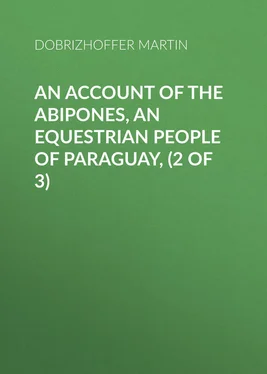Martin Dobrizhoffer - An Account of the Abipones, an Equestrian People of Paraguay, (2 of 3)
Здесь есть возможность читать онлайн «Martin Dobrizhoffer - An Account of the Abipones, an Equestrian People of Paraguay, (2 of 3)» — ознакомительный отрывок электронной книги совершенно бесплатно, а после прочтения отрывка купить полную версию. В некоторых случаях можно слушать аудио, скачать через торрент в формате fb2 и присутствует краткое содержание. Жанр: foreign_antique, foreign_prose, на английском языке. Описание произведения, (предисловие) а так же отзывы посетителей доступны на портале библиотеки ЛибКат.
- Название:An Account of the Abipones, an Equestrian People of Paraguay, (2 of 3)
- Автор:
- Жанр:
- Год:неизвестен
- ISBN:нет данных
- Рейтинг книги:3 / 5. Голосов: 1
-
Избранное:Добавить в избранное
- Отзывы:
-
Ваша оценка:
- 60
- 1
- 2
- 3
- 4
- 5
An Account of the Abipones, an Equestrian People of Paraguay, (2 of 3): краткое содержание, описание и аннотация
Предлагаем к чтению аннотацию, описание, краткое содержание или предисловие (зависит от того, что написал сам автор книги «An Account of the Abipones, an Equestrian People of Paraguay, (2 of 3)»). Если вы не нашли необходимую информацию о книге — напишите в комментариях, мы постараемся отыскать её.
An Account of the Abipones, an Equestrian People of Paraguay, (2 of 3) — читать онлайн ознакомительный отрывок
Ниже представлен текст книги, разбитый по страницам. Система сохранения места последней прочитанной страницы, позволяет с удобством читать онлайн бесплатно книгу «An Account of the Abipones, an Equestrian People of Paraguay, (2 of 3)», без необходимости каждый раз заново искать на чём Вы остановились. Поставьте закладку, и сможете в любой момент перейти на страницу, на которой закончили чтение.
Интервал:
Закладка:
I have already observed that they seldom grow bald, and not grey till at an advanced period of life. Even when arrived at extreme age they can hardly be said to have grown old, like certain plants which are always green and vigorous. Cicero, in his treatise on Old Age, bestows great praise on Massinissa, king of Mauritania, who, at ninety years of age, cùm ingressus iter pedibus sit, in equum omninò non ascendit: cùm equo, ex equo non descendit. Nullo imbre, nullo frigore adducitur, ut capite operto sit. Exequitur omnia regis officia et munera, etc. The Roman orator would find all the old Abipones so many Massinissas, or even more vigorous than Massinissa. He would scarce believe his own eyes were he to see men, almost a hundred years old, leap on to a fiery horse, without the aid of a stirrup, like a boy of twelve years old, sit it for hours, and even whole days, beneath a burning sun, climb trees for honey, travel or lie upon the ground in cold or rainy weather, contend with the enemy in battle, shrink from no toils of the army or the chase, evince wonderful acuteness both of sight and hearing, preserve all their teeth quite sound, and seem only to be distinguished by the number of their years from men in the prime of life. All these things will hardly be credited in Europe where they are so rare. In the colonies of the Abipones I daily beheld old men, like youths in every other respect but that of age, without surprize. If a man dies at eighty he is lamented as if cut off in the flower of his age. Women generally live longer than men, because they are not killed in war, and because the moistness of their nature renders them more long lived. You find so many old women a hundred years of age, amongst the Abipones, that you may wonder at, but will scarce be able to count them. I cannot say that the pedestrian nations of Paraguay enjoy equal strength and longevity. The Guaranies, Lules, Isistines, Vilelas, and other pedestrian Indians, are subject to diseases like the Europeans, and both feel old age, and discover it by their habit of body. Their lives, like those of Europeans, are sometimes short, sometimes long. You find very few men a hundred years old, or even approaching to that age amongst them. It is worth while to investigate the causes of this exceeding vigour of the Abipones.
CHAPTER VII.
WHY THE ABIPONES ARE SO VIGOROUS AND LONG-LIVED
The Abipones are indebted for their strength and longevity partly to their parents, partly to themselves. The vigour of youth, preserved by temperance, accompanies them during the whole of their lives, and is even transmitted to their children. The Abipones never indulge in licentious gratifications during youth, and though of a fiery temperament, debilitate their constitutions by no irregularities. They amuse themselves with conversation, mirth, and jesting, but always within the limits of modesty. By a sort of natural instinct peculiar to themselves, both boys and girls, hold in abhorrence all means and opportunities of infringing the laws of decorum: you never see them talking together either publicly or privately; never idling in the street. The girls love to assist their mothers in domestic employments; the continual exercise of arms and horses engrosses the chief attention of the young men.
The Indians of other nations are often shorter, slenderer, and less robust. Many of them consume away before they arrive at manhood; others grow prematurely old, and die an untimely death. Do you enquire the cause? I will tell you my opinion on the subject. Many are unhealthy because their parents are so; others from being oppressed with Labour, and very poorly provided with food, clothes, and lodging; the majority because they have exhausted their natural vigour by indulging from their earliest youth in shameful pleasures. Libidinosa etenim, et intemperans adolescentia effœtum corpus tradit senectuti , as Cicero observes, in his treatise on Old Age. How many of those who die a premature death would deserve to have this epitaph engraven on their tomb, Nequitia est quæ te non sinit esse senem . Too early marriages are often a cause why we find the other Indians weaker and less vigorous and long-lived than the Abipones, who never think of entering the matrimonial state till they are near thirty years old, and never marry a woman under twenty; which, as philosophers and physicians say, conduces much to the preservation of strength, lengthening of life, and producing robust children. It cannot be doubted, that tender parents never produce very strong children; and since the affections of the mind are consequences of the habit of the body, as Galen teaches with much prolixity, it cannot be wondered that such children should be as imbecile in mind as in body.
Their education also conduces greatly to form the manners and strengthen the bodies of the Abipones. For, as Quintilian observes, in his first book of Institutes, that soft kind of breeding, which we call indulgence, relaxes all the nerves both of the mind and body. No one can object to the education of the Abipones on account of its delicacy. The children are plunged into a cold stream, if there be one at a convenient distance, as soon as they see the light. They know of no such things as cradles, feathers, cushions, swathing-clothes, blandishments, and toys. Covered with a light garment of otters' skins, they sleep wherever chance directs, and crawl upon the ground like little pigs. Whenever a mother has to take a journey on horseback, she places the child in a bag made of boars' skins, and suspended from the saddle along with the puppies, pots, gourds, &c. The husband will often come and snatch his little son, as he is sucking, from its mother's arms, set him on his own horse, and behold him riding with eyes sparkling with pleasure. When a mother is swimming in a river for the sake of a bath, she presses her infant to her breast with one hand, while she uses the other as an oar. If the child be pretty big, it is thrown into the water, that it may learn to swim while it is but just beginning to walk. You seldom see little boys but just weaned walking in the street without a bow and arrow. They shoot birds, flies, and all kinds of small animals. Their usual amusement is shooting at a mark. They go out every day on horseback, and ride races with one another. All these things undoubtedly conduce much towards strengthening and enlarging the body. Would that European mothers could be brought to discard the unnatural artifices and indulgences used in the bringing up of their children! Oh that they would moderate the bandages and cloths with which they bind, and as it were imprison and enchain the tender little bodies of their infants! then should we see fewer bandy-legged, hump-backed, dwarfish, weak, and diseased persons in Europe.
The Abipones wear a garment not tight to their bodies, but loose and flowing down to their heels; calculated to cover, not load and oppress the body, and to defend it from the injuries of the weather, without preventing the perspiration, or impeding the circulation of the blood. All the wise people of the east, and most of the ancient Germans, made choice of a large wide garment. What if we say that their bodies were consequently larger, and filled a wider space? Those who wish to enjoy their health, should attend to the maxim ne quid nimis , in dress as well as in other things. On the other hand too scanty clothing is assuredly prejudicial to health. Prudent persons vary their dress according to the state of the air, as seamen shift their sails. Even the Abipones of both sexes, and of every age, though satisfied at other times with a woollen garment, put on a kind of cloak, skilfully sewed, of otters' skins, when the cold south wind is blowing. This skin garment bears some sort of resemblance to the cloak which we priests wear to sing vespers in the church.
Читать дальшеИнтервал:
Закладка:
Похожие книги на «An Account of the Abipones, an Equestrian People of Paraguay, (2 of 3)»
Представляем Вашему вниманию похожие книги на «An Account of the Abipones, an Equestrian People of Paraguay, (2 of 3)» списком для выбора. Мы отобрали схожую по названию и смыслу литературу в надежде предоставить читателям больше вариантов отыскать новые, интересные, ещё непрочитанные произведения.
Обсуждение, отзывы о книге «An Account of the Abipones, an Equestrian People of Paraguay, (2 of 3)» и просто собственные мнения читателей. Оставьте ваши комментарии, напишите, что Вы думаете о произведении, его смысле или главных героях. Укажите что конкретно понравилось, а что нет, и почему Вы так считаете.












